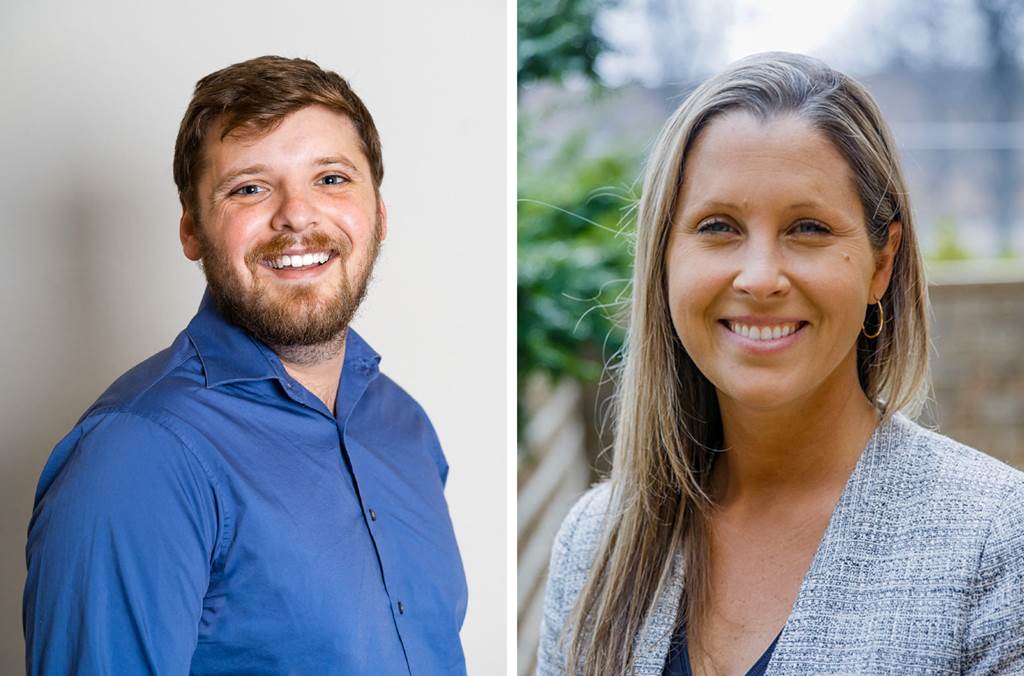Math Department at Lake View High School Recognized for Four Straight Years
19 July 2021
Mr. Peter Smith was one of 35 educators across the country to be named a Knowles Foundation Teaching Fellow this year.

Paul (PJ) Karafiol, the principal of Lake View High School (LVHS), says that having an award winner on his staff would be evidence of that individual being a terrific teacher, but the fact that his math department has had four teachers recognized at either the state or national level over the past four years is evidence that this department is doing many, many things right.
Two of those four individuals are Ms. Erin Unander and Mr. Peter Smith. Ms. Unander received a Golden Apple Award in 2019 and Mr. Smith was one of 35 educators across the country to be named a Knowles Foundation Teaching Fellow this year.
What does it mean to be good at math? Ms. Unander explains that she has reflected on this question since she became an educator. She chose to pursue math education as a career because she wanted to shift perceptions around who could succeed within a math classroom, which is typically viewed as a male-dominated space.
“So many kids come into our classrooms on the first day and share that they’re not going to enjoy our classes because they don’t think they’re good at math,” she said. “As teachers, it’s up to us to show them that there is no shame in making a mistake or taking a few extra minutes to solve a problem. We want to step away from math only being about right versus wrong.”
One of the ways LVHS math teachers are implementing this idea is through moving toward standards-based grading as their way of assessing each student’s progress. Rather than viewing a grade as a cumulative average of a student’s performance of different assignments and tests, this approach instead measures their mastery of different learning objectives. Mr. Smith believes this connects back to how he and his colleagues are prioritizing equity within their work.
“Equity looks like giving every student the opportunity to be a mathematician and valuing each student’s input while promoting voices that have been historically marginalized within mathematic spaces,” he said. “We’ve been holding a critical lens up to how we’ve been grading in the past and are spearheading standards-based grading as we think more about the skills our students need to be successful.”
The department has also recognized that its students’ needs are not always academic. This past school year, they contributed to LVHS’ school-wide focus on social-emotional learning (SEL), specifically tailoring their efforts to help students proactively work through stress and anxiety.
“At first, I was curious as to why SEL was going to live in the math department, but, as we thought about it more, I think our team realized that anxieties around doing math were escalating because of the shift to remote learning,” said Ms. Unander. “In our classes, we would talk with the students about how they were doing instead of always doing a math lesson, and we learned so much from that. This was not a wasted year at all.”
To keep their momentum around priorities such as equity and SEL going, the team has relied on lesson study as their method of continuous improvement over the past several years. Educators who teach the same course—for Ms. Unander and Mr. Smith, that would be geometry—consistently collaborate to share best practices and discuss success stories and areas for improvement.
“Our department does a great job of being open about what is going on in our classrooms and being critical about our practice and allowing each other to observe what is going on and figure out ways to make our instruction better,” said Mr. Smith. “At the same time, our mix of personalities is also key to improving our department. We all genuinely enjoy working with each other.”
While Ms. Unander has been teaching for 18 years and could name quite a few do’s and dont’s that she’s learned since she started, she notes that one of the most critical pieces of advice she’d give to any teacher is to always be open to change.
“If we’re telling our students that it’s okay to make mistakes, we need to recognize that it’s okay for us to try things another way if the first way doesn’t work out so well,” she said. “It can be challenging to be vulnerable in that sense, but as technology and our world change, we need to be prepared to change our practice as needed to best serve our students.”
Mr. Smith is not the only educator within the district to be recognized for his exceptional teaching this year. Click here to read our feature about a science teacher from James Ward Elementary School who was named a state finalist for the Presidential Award for Excellence in Math and Science Teaching.
Related Stories
25 April 2025
Taking a Leap of Faith: First-Year AP Shares Her Journey to School Leadership
AP Jordan thrives in leading with compassion and love each and every day.
18 April 2025
Celebrating Mariachi in Music Class: Take Five with Phillip Olazaba
Mr. Olazaba is known for being a caring teacher who has high expectations while still making learning fun.
18 April 2025
Learning All About a Wonderful Special Education Classroom Assistant at Skinner North Classical School
Ms. Boonstra has found a great fit as a special education classroom assistant.
17 April 2025
Introducing Trevor Nicholas: Golden Apple Finalist for Excellence in Teaching
Mr. Nick likes to remind himself that "hurry is often the opposite of love" when teaching music to students as a vehicle for healing.




